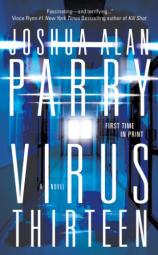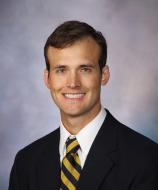Excerpt
Excerpt
Virus Thirteen

1
For Dr. James Logan, it was not just another painfully dull lecture on his latest research. Today he was announcing a breakthrough that would change the world. After nearly a decade of work, James and his wife, Linda, had finally done it. The couple stood in the shadows just left of the stage. They both stared absently at the podium, the glare of lights shining down onto it like an alien tractor beam. The audience was buzzing; hundreds of reporters, students, and scientists had packed themselves into the auditorium.
Without warning, a small man appeared at their side. The man had a professorial bush of a mustache that waved in an absent wind as he talked.
“Are you two ready?”
James nodded and squeezed his wife’s hand.
The man nodded and brushed by him, trotting out into the blinding sea of light. The mass of humanity hushed as he began to speak.
“Ladies and Gentlemen. First of all, just let me say that we are honored that GeneFirm chose The University of Texas to come and present their new medical breakthrough. We hope in the future that this university can continue to work with GeneFirm in the research and development of new cures and therapies. Now it is my pleasure to present Dr. James Logan and Dr. Linda Nguyen, the husband and wife team who head the Gene Therapy department at GeneFirm Incorporated, the largest and most esteemed biotech company in the world. Interestingly, James and Linda were both children of GeneFirm scientists, both engineered and raised on GeneFirm’s massive research facility west of the city. They went on to earn their doctorates from the University of Texas before moving back to GeneFirm to start their careers. The two of them have authored dozens of papers on gene therapy and are among the brightest rising stars in our scientific community. So without further ado, I present to you Dr. Logan and Dr. Nguyen.”
James gave one last squeeze to his wife’s hand as they stepped into the haze of the auditorium lights. James stood six feet tall with a slim, yet muscular build. Linda was almost the same height in her high heels, her skin tone a wonderful brown next to the stark whiteness of her husband.
James stopped in front of the microphone. He looked out over the crowd with pleasure, barely able to contain the excitement coursing through him.
“Good morning and welcome. Thank you all for being here. We are very excited to share our research with you today; however, before that I would like to start off this morning with a little history lesson for the students in the audience.”
“In terms of preventable deaths, the cure for cancer has been one of the single greatest medical discoveries in human history, perhaps only surpassed by the creation of the vaccine by Edward Jenner. While the development of the smallpox vaccine can be accredited to our bovine friends and the cowpox virus that afflicted them, the cure for cancer originated in a remarkable parasitic trematode isolated from the Ganges River. The Ganges was quite possibly the most polluted river on the planet at that time. It is ironic that the toxic environment mankind created, which increased the incidence of cancer in the first place, eventually became so carcinogenic that it led to a cure, a mutation-resistant flatworm called Schistoma immortalitas. From this parasite, Dr. Weisman, the founder of GeneFirm, managed to isolate a group of genes that had paradoxically mutated the ability to resist further mutation. By inserting the flatworm’s mutation-resistant genes into humans, he was able to create a strain impervious to carcinogens and random mutations. In other words, he created a human genotype that was effectively cancer proof.”
James was speaking of the original Dr. Weisman, somewhat of a godhead among the people of GeneFirm. Dr. Weisman had been dead for quite some time now. Dr. Weisman II was currently the CEO of GeneFirm. But no one ever mentioned “II” to his face. This would not be very politically correct. To call a clone “the second” or “number two” was a slur of sorts, since most of them didn’t gravitate toward the idea of not being unique individuals. Apparently it was very much a part of human nature to want to be an original. It was no wonder that most of the clones, created back when it was still legal, were inevitably prescribed a mood stabilizer, antidepressant, or some other cheery combination of psychiatric medications.
James swept his hand out. “Of course there is controversy shrouding all of this. This great leap in disease prevention has resulted in a crippling overpopulation of our planet. Many complain that eliminating cancer has made humanity unsustainable. But I ask you this: how could it be ethical to do anything else? As a doctor, if you have a treatment that is effective, how can you not use it? The Hippocratic oath says that above all else we must do no harm. So to answer the critics, I argue that it would be absolutely amoral to consciously let a child be born today with the potential to develop cancer, or any disease for that matter. Our goal for the future should be to limit the birthrate and develop more sustainable ways of living, not to limit medical treatment. You cannot stop the progress of man.”
James paused. Out of the blue, he was beginning to feel light-headed. He had been having episodes like this for the last couple months; he had always been in perfect health, so he didn’t quite know what to make of it. Looking down, he was puzzled to see that his hands were flushed bright red. James wobbled for a moment at the podium; an awkward silence was fast falling over the room.
Linda quickly pushed by her husband, replacing him at the microphone. She flashed a brief look of concern in his direction. Not wanting the moment to be ruined, she cleared her throat and continued.
“Unfortunately these cancer-proof genes, in each and every one of us, are not inheritable, meaning that every child must have them inserted while an embryo before being implanted back into the mother. This has not only proven to be very costly for our health care system, but it also leaves room for people to fall through the cracks. For instance, those individuals who freely conceive—illegally—without cancer-proof engineering, or those who do not have access to conception engineering in third world countries. For decades, GeneFirm has been trying to develop a way to make the cancer-proof genes easily deliverable and inheritable.”
James was having trouble hearing the words coming out of Linda’s mouth. Her voice soon disappeared completely, leaving only a buzzing in his ears. The room was also getting extraordinarily hot. With one hand he loosened his tie, which at the moment seemed to be constricting around his neck like a python. He gulped painfully, his mouth dry. Breathing was becoming a chore.
At the podium, Linda continued talking, unaware of what was unfolding behind her. She never saw her husband begin to sway back and forth.
“Well, that is all about to change. I am excited to tell you that our research has led to an incredible breakthrough: the creation of a viral vector that can deliver the cancer-proof genes to an individual and make them a permanent fixture. I’m talking about a set of inheritable cancer-proof genes that can be delivered through a simple injection. This will revolutionize the world. From the largest cities to the most remote and poverty-stricken areas, we now have a permanent cure for cancer—a cure for everyone.”
Linda’s chest puffed up in pride. She addressed the audience confidently, “Now we’ll take questions.”
There were hundreds of questions, but none of them were answered. James toppled to the floor behind Linda and began to shake, his head slapping the ground again and again like a freshly landed fish gasping for air.
As the airplane banked sharply to the left, the captain’s voice came on over the intercom announcing their imminent landing. A man in a window seat looked out over the American landscape beneath him with a scowl. Where once there was a grand expanse of green, there were now only concrete plains. Throngs of cars choked the roadways—boxy machines crawling everywhere like an army of mindless ants. Flying over cities during the day always depressed him. At night it was a different story, when the sun disappeared leaving only the sterile glow of city lights, transforming the ground below into a mirror image of the space above. But during the day there was little beauty about the city. Just filth. Like a termite mound made of bug spit and wood shavings, standing ugly against the horizon. It was the final flight of his long trip. In the last couple weeks the man had circumnavigated the globe like a space-age Magellan. But it was the same story everywhere he went: overpopulation, crime, infrastructure decay, and smog so thick it stained your teeth.
Unfortunately this last flight had been disturbed by a small child in the seat next to him. Three? Four? Not old enough to show any common decency. The child had been busy playing some obnoxiously loud video game on his father’s phone for the last couple hours. The game involved a cartoon polar bear on some kind of gluttonous seal binge, mauling gun-toting humans along the way. The irritating growls, pings, and chimes of the game grated against the businessman’s nerves, like an ice pick to his forehead. The child’s father, sitting in the aisle seat, was busy snoring loudly.
He thought now was as good a time as ever. Out of his suit jacket he produced a tiny plastic spray bottle. There was only a tiny bit of fluid left inside; enough for one more dose, he hoped. He stared down at the child slapping the buttons on his asinine game. The child eventually tilted his head upward and the two locked eyes.
Without warning, the man sprayed the kid in the face. The child’s head recoiled, his features contorting as the mist met skin. To the man’s disbelief, the kid seemed completely unphased by the event, returning without comment to his video game, the sounds returning once again to shred what was left of the man’s waning patience.
“Stupid fucking kid,” he whispered, “turn that off.”
The bottle remerged from the man’s coat. This time he did his best to spray the mist directly into the boy’s eyes.
This time the boy started crying and rubbing his eyes furiously. That’s better, thought the man. He lay his head back and closed his eyes.
To his relief, the stewardess’ voice crackled again from the intercom: “Please make sure your tray tables and seats are in the upright position and that your seat belts are fastened as we prepare to land. The weather on the ground is sunny and sweltering with a high of 110 degrees. Welcome to Austin, Texas.”
Copyright © 2013 by Joshua Alan Parry




